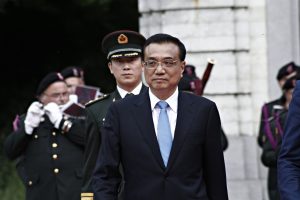After ten years as China’s premier, Li Keqiang looks destined to be remembered as the country’s weakest head of government in decades, whose influence has paled in comparison to current strongman leader Xi Jinping. This imbalance was vividly illustrated at the Chinese Communist Party (CCP)’s 20th National Congress last October, where Li’s faction was emphatically outmaneuvered by Xi and his allies.
But perceived legacies and actual achievements are not the same thing. This is especially true in China, where strict control of official narratives can heavily distort the public memory of political figures. Take former paramount leader Deng Xiaoping, mythologized as the architect of China’s Reform and Opening. As Julian Gewirtz has argued, many of the key ideas and policies of the Deng era actually came from former Premier Zhao Ziyang, before he was effectively erased from CCP history in 1989.
I contend that Li may be another top leader whose perceived legacy will not fairly reflect his actual contributions to public life in China. Yes, his political weakness has undoubtedly limited what he has been able to achieve over the last decade. However, Li has been a consistent champion of reformist principles, and he has recently achieved a small but significant victory for reformism among China’s political elite.
By reformism, I refer loosely to a wing of the CCP that has, since the late 1970s, favored greater marketization and pragmatism over a more state-led approach to economic management. Even today, the party elite can be broadly divided into reformists like Li and hardliners like Xi. While Xi has often paid lip service to Reform and Opening, it is not hard to see how his values stand in opposition to the reformist values of his post-Mao predecessors.
As the legal scholar Carl Minzner has suggested, Xi’s “New Era” might be better understood as a “Counter-reform Era,” one in which authoritarianism has been expanded and pragmatism diminished. The last decade has indeed seen an end to the growth-at-all-costs model, with costs such as pollution and corruption particularly targeted by Xi.
Yet despite Xi’s counter-reformist approach to managing China’s political economy, reformist values have proven their staying power. After years of regulatory expansion and COVID-induced closures, the last few months have seen the principles of Reform and Opening return to a position of importance in Beijing’s policymaking hierarchy.
Of course, many issues and stakeholders have played a role in bringing about China’s post-COVID reformist pivot. But Li may deserve more credit for influencing this turn of events than he will ever be given in the official narrative. During 2022, Li became increasingly vocal on economic issues, an outspokenness that some observers misunderstood (or misrepresented) as a direct challenge to Xi.
Yet while Xi was never seriously challenged by Li personally, he was challenged by the reformist values that Li championed among the party elite. After the Beidaihe conclave of senior CCP leaders last August, Li went to Shenzhen to lay a wreath at Deng’s statue. Li’s comments that the “Yellow River and Yangtze River will not flow backward” had echoes of Deng’s mantra to “never turn back.”
At the time, some observers saw this as nothing more than a swan song for Li. However, the fact that he made this gesture shows the topic of reformism had become a point of contention in the party ahead of the congress. It also showed that there remains a significant reformist caucus within the CCP, such that Li was able to make such a thinly-veiled statement of support for the reformist agenda.
It is telling that several months later Xi’s congress work report declared “the door of China’s Reform and Opening will only open wider and wider.” Several weeks later, Beijing had rapidly moved to reinstate reformist ideals scrapped during the pandemic. Borders started to reopen, businesses could operate freely again, and regulatory crackdowns were declared over.
Subsequently, Li’s championing of reformism has only intensified. While giving Spring Festival greetings to officials at the State Administration for Market Regulation in January, Li highlighted the importance of continuously expanding China’s market economy. During inspections of the National Development and Reform Commission and the Ministry of Finance in February, Li again stressed continued efforts to promote Reform and Opening.
In short, Li’s efforts to revive the party’s commitment to reformism appear to have won out in the end. Yet this victory has not equated to a revival of Li’s personal power. Instead, it points to the incredible power of reformist values in China’s political economy, a power so great that it transcends even powerful strongmen like Xi.
To be sure, many aspects of Xi’s counter-reformist approach remain in place. China has not suddenly been transported back to the heady days of the Reform Era. But as I’ve written before in The Diplomat, economic prosperity remains fundamental to Beijing’s legitimacy, despite Xi’s recent efforts to develop non-economic sources of authority.
Li is now preparing to leave the public stage. His political capital appears expended. Yet the reformist values that Li champions will live on, thanks in part to his continued advocacy. For Li Keqiang’s personal legacy, these final moments of his decade-long premiership have likely been some of the most important.

































